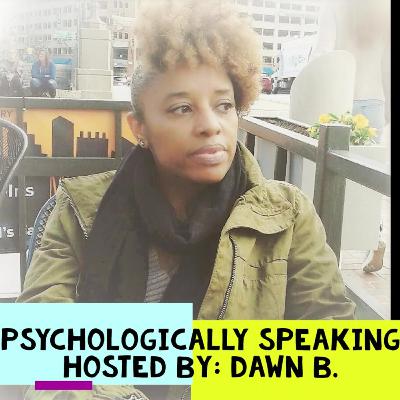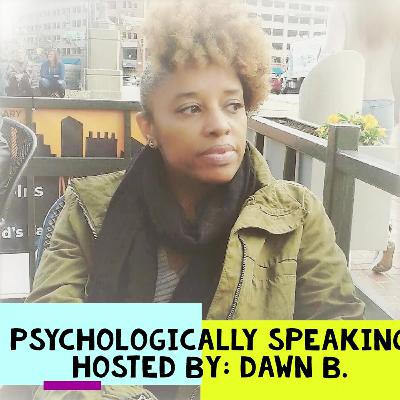Discover Psychologically Speaking
Psychologically Speaking

34 Episodes
Reverse
Have you ever wondered how two people can come from the same family, yet they're nothing alike? Why is one sibling gregarious and outgoing, yet another is quiet and mild-mannered? Freud might say that the loud, outspoken sibling didn't get enough attention as a child and is driven by their id. And the quiet one might be overly anxious and experiencing intra-psychic conflict or some type of inner, unresolved turmoil extending from a traumatic childhood experience. Whatever your views on Freud might be, you have to admit, the cigar-smoking gentleman from Vienna gave us some fascinating, psychological concepts to ponder. Take a listen and see where you stand on Freud's views.
Where do you fall on the Big 5 continuum? Are you more like Superman or Clark Kent? Have you ever taken a personality inventory? What's so bad about being introverted? There's power in silence! Listen to discover what personality psychology has to say about the characteristics that make you uniquely you! You might learn something new!
In the words of EnVogue, "Free Your Mind and the Rest Will Follow." I offer another version of this, "Free Your Body, and Your Mind will Follow." Movement helps us resolve conflict and release emotions and trauma from our bodies. Movement is the key to a happy, healthy mind and speaks to the strength of the intricacies of the mind-body connection. Listen to this episode to discover more exciting research findings from the science of movement.
Are you a wallflower? Or are you the life of the party? If you're anything like me, there's something about hearing music that makes you want to move! Maybe that's why I'm typically in a positive mood, and I don't let too many things get me down. No, I'm not talking about toxic positivity. That's another topic for another episode. I'm talking about the positive effects of movement. Movement can boost your mood, make people like you, and even boost your self-esteem. Take a listen to discover what scientists are saying about the power of movement. Get moving. You'll be glad you did!
Stress is everywhere. There's just no such thing as a stress-free environment. Minimizing the effects of stress begins with managing stress. Stressful events are magnified in your mind. Think about the mind-body connection and how powerful it can be. Take a listen for some helpful tips on how to manage your stress, take control of your mind, and your body will follow!
If you're like 60 - 70% of the US population, you've already abandoned your new year resolutions. Instead of new year resolutions that you'll dump in a few weeks, why not focus on target words and implementing new habits? What can you do to sustain your habits and start reaching the goals you've set for yourself? Creating a new habit isn't easy, but you can do it! KISS (Keep it Short and Simple), and you'll be on your way to a habit-forming success! Take a listen to find out how!
Hey everyone! If you've been missing me the last few months, I'm happy to tell you, I'm baaaaaccckkk! I've missed you too. I've been making some improvements, adding some credentials, and doing the business of life. I hope things have been going well for you. I've got some great stuff coming up in 2022 (a breakdown of chakras, self-care tips, relationship advice, wellness talks, and much more!). Please listen, share, and give me a shout. You won't be disappointed! And as always, thanks for hanging out with me today.
This episode addresses 3 questions related to psychology: (1) What is psychology, (2) What are the origins of psychology, and (3) What can I do with a psychology degree? Or What do psychologists do? This podcast is for anyone who is interested in psychology and how psychological constructs are applied in everyday life.
Do you often find yourself telling stories characterized by limiting beliefs with you as the main character? Our instinct is to find comfort in the negative stories we tell or hear about ourselves. Wouldn't it be great if we could change the narrative and tell another story? Listen to find out how to challenge the stories that limit you or hold you back and replace them with positive tales that reflect your best self.
Have you ever read about a scientific study and wondered how did they get away with that? How were they able to do a study where the participants allowed them to monitor and analyze all of their electronic communication? How in the world did they get participants to agree to be shocked as part of an experiment? Surely there's something fishy going on. I smell salmon! How about you? Believe it or not, scientists can design and conduct research studies like these and others. But some rules must be followed. Take a listen to find out what the rules are. You might be surprised by what you hear!
Have you ever participated in market research or a scientific study? Have you ever wondered about research designs or what goes into designing a scientific study? In this episode, coming to you from my corner office (seated on the comfy corner of my couch), I discuss the advantages and disadvantages of four different research designs. Take a listen! I hope you learn something new.
Americans spend hundreds of millions of dollars each year on magnetic bracelets, belts, vests, pillows, and mattresses, hoping to gain clarity, improved memory, and relief from pain. But what evidence do we have that materials such as these provide "scientifically proven healing benefits?" How do scientists evaluate these and other pseudoscientific claims? What are some strategies you can use to develop your critical and scientific thinking skills? Take a listen to find out why skeptics do it with their eyes open!
Did you know that liking curly fries and Morgan Freeman's voice is linked to high intelligence? Michael Kosinski and colleagues (2013) found evidence of these and other interesting correlations after studying the pages of 58,000 Facebook users. But what do findings from studies like this one really tell us, if anything? How do psychologists conduct research, and what are empirical questions? Listen to this latest episode to find out!
What comes to mind when you hear the word wellness? Last year's pandemic highlighted the importance of being physically and mentally healthy. But did we become concerned enough about our overall well-being to explore the topic from a holistic perspective? In this episode, I introduce you to the 8 domains of wellness that affect our overall state of well-being in so many ways. Listen as I discuss how behavior changes for the better lead to changes that make your life better. Here's to your success at being your very best!
Psychology is a science and a profession fueled by curiosity. At the forefront of applying psychology to everyday life are four big ideas: Critical thinking, behavior as a biopsychosocial event, dual processing, and human strengths. Which of these seems most interesting to you and why? What is something you've experienced that relates to these ideas? Are you able to make the connections between these four big ideas and your daily experiences? If you listen to this podcast, the answer is yes!
Have you ever found yourself saying, "Duh, I could've told them that!" after hearing the results of a psychological experiment? There is a common misconception that the findings from psychological research are common sense knowledge or intuitive, so why do we need psychological science? Psychology is more than a soft science. Psychology is a science based on empirical evidence, a healthy sense of skepticism, and structured research project design. Take a listen to find out why psychology is the "science with attitude!"
Did you know that over 50% of the population will be diagnosed with a mental illness or disorder at some point in their lifetime? This means that many of us will experience, know someone who will experience, or know someone who has experienced the pain and confusion related to mental illness. What does this say about the state of psychological health? Can we see mental illness through a preventive medicine lens? What are some ways we can rescue those in danger of falling into the river of mental health troubles and being swept away? Take a listen to find out.
If you're suffering from a lack of motivation, don't worry, it's natural. By nature, our brains are wired to resist change. But we can prepare for what's coming when we plan ahead, find an accountability partner, visualize your success and act on it! And most importantly, celebrate your success, no matter how small it might seem. Celebrate the journey. After all, the journey is what gets you to your destination! Now, tell me, what are you aspiring to do? Don't let a lack of motivation hold you back!
Are you a crier? Do you cry when the wind blows too hard? Do you know someone that never cries? For years scientists have argued about the reasons we cry. Tears of joy appear to be expressed in the same manner as tears of sadness. It's only the emotion that distinguishes the two. And, surprisingly, the tears we shed when chopping onions are chemically different than the tears we cry when expressing our feelings. Take a listen to hear some interesting research findings in the up-and-coming field of the science of crying. Enjoy!
What do you do when you're experiencing an episode of life interrupted? You seek enlightenment, spiritual growth, and awakening. At least that's what I did when the world stopped last year in the wake of a pandemic. During an uncertain time, I started practicing yoga. And I am so glad I did! Studying yoga has allowed me to explore Eastern philosophy methods and link them to Western psychology concepts. I am enjoying my journey to maintaining and achieving optimal well-being and reaping the benefits found at the intersection of east meets west!






